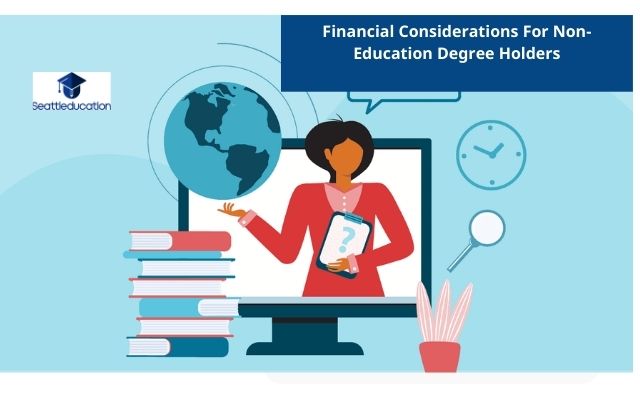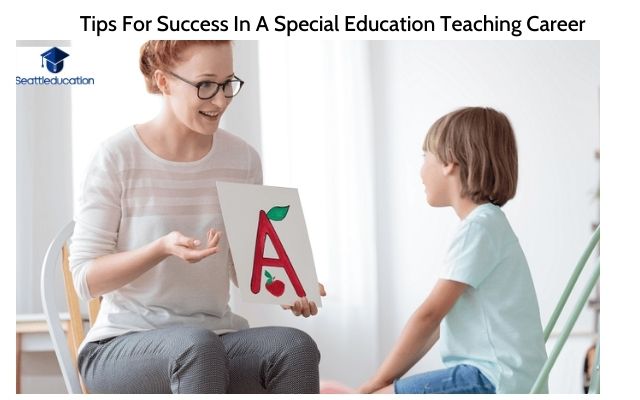Teaching Careers Without Education Degree: Best Evaluation
Teaching Careers Without Education Degree: Teaching is an incredibly rewarding career, but many people don’t realize that you don’t necessarily need a college degree in education to become a teacher. In fact, there are a number of teaching opportunities available for those without formal degrees or certifications. This article will explore the various options and provide advice on how to pursue them. For those looking to enter into the world of teaching without investing in traditional educational credentials, it can be hard to know where to start.
Let’s get started!
The Demand For Teachers With Diverse Backgrounds
The demand for teachers with diverse backgrounds is growing rapidly. With the ever-changing education landscape, more and more schools are seeking individuals who have specialized skills that can better serve their students’ needs. Teachers must now be able to adapt quickly and possess a variety of qualifications in order to stay competitive.

For example, some districts may require experience teaching English as a Second Language or Special Education courses; others might need specific technical expertise in STEM subjects like computer science or robotics. Whatever the subject area, it’s essential for applicants to demonstrate their aptitude when applying for positions.
Additionally, many employers are recognizing the value of career switchers and professionals from other fields entering the teaching field. These individuals often bring unique perspectives and real-world experiences that can create dynamic learning environments for students.
Teacher preparation programs also offer alternative paths into the profession such as Teach For America, which provides accelerated teacher certification along with professional development opportunities. Ultimately, these pathways provide aspiring educators with greater flexibility while still meeting required state standards to become certified teachers.
Leveraging Soft Skills In Teaching
As the demand for teachers with diverse backgrounds increases, so too does the need to leverage these individuals’ soft skills in order to create a successful teaching career.
Soft skills refer to those attributes that are neither learned nor taught but instead come naturally and require practice and refinement over time. These include characteristics such as strong communication, empathy, adaptability, self-awareness, problem solving capabilities and creativity.

When it comes to teaching careers without education degrees, these soft skills can be incredibly valuable tools in helping an individual succeed in their profession.
Communication is key when working with students of all ages; not only must one be able to effectively convey information but also build relationships with students based on trust and understanding.
Empathy allows educators to relate to students more intimately by showing them they care about their well-being and success both inside and outside of the classroom.
Adaptability ensures that instructors are prepared for any situation or challenge, while self-awareness helps them recognize areas where improvement may be needed.
Lastly, problem solving abilities allow educators to think quickly on their feet should unforeseen issues arise during class, while creativity encourages them to develop unique solutions tailored specifically for student needs.
Soft skills provide a powerful foundation upon which teachers from diverse backgrounds can establish a respected presence within their classrooms — allowing them to make meaningful connections with young minds while inspiring future generations of learners along the way.
Mentorship And Support Systems For Non-Education Degree Holders
Let’s talk about how we can develop mentorship relationships and establish support systems for non-education degree holders who are looking to pursue a teaching career.
We can discuss ways to create an environment where they feel supported and confident in their ability to succeed.
Developing Mentorship Relationships
Starting a career in education without an educational degree can be daunting. You may worry about not being adequately supported or finding someone to mentor you along the way.
It’s important for those who pursue a teaching career without an education degree to develop strong mentorship relationships with other educators, both within and outside their field. This will help provide guidance, insight, and support as they transition into their new role and gain experience in the classroom.
With these relationships, non-education degree holders have access to resources that could otherwise be difficult to find on their own. By creating meaningful connections with experienced teachers, aspiring instructors will feel more confident in their ability to succeed in this rewarding profession.
Establishing Support Systems
Once connections have been made with experienced teachers, it’s important to establish a strong support system.
This can be done within the classroom and outside of it by collaborating on projects, attending workshops together, and sharing ideas.
Having someone in your corner who understands what you’re going through as an educator without an education degree will help make the journey smoother.
Additionally, having access to resources that may not be available otherwise is essential for non-education degree holders to reach their professional goals.
With these relationships in place, aspiring instructors can feel more confident in their ability to succeed in this rewarding profession and know they always have someone to turn to when faced with difficult teaching scenarios.
Alternative Teaching Opportunities
Regarding international schools, many teachers don’t need a degree to teach abroad, although it can help to make the transition easier.
For online teaching and tutoring, there are opportunities where a degree isn’t necessary, but having one can make you more competitive.
As for adult and continuing education, there’s a huge demand for professionals with specialized knowledge and experience, so you don’t necessarily need an education degree.
International Schools
Traveling the world and teaching abroad is an exciting opportunity for many. At international schools, you don’t necessarily need a degree in education to start your career. With various programs offering classroom experience, training and certifications, anyone can become a teacher at these institutions.
From developing countries with limited resources to more affluent areas, international schools offer opportunities for teachers of all backgrounds and skill levels. Teaching abroad allows you to immerse yourself in different cultures while also giving back through meaningful work – it really is the perfect combination!
Online Teaching And Tutoring
Moving away from traditional teaching methods, online tutoring and teaching is becoming increasingly popular. It’s a great way to use your knowledge and skills without having to leave the comfort of home!
You can work with students around the world, all while being able to set your own hours and rates. Plus, there are plenty of resources available for teachers who need help getting started – so it’s perfect if you’re new to this type of educational setting.
With more people turning to technology in their everyday lives, this could be a rewarding career option that definitely pays off both financially and personally.
Adult And Continuing Education
Moving onto adult and continuing education, this is a great way to get involved in teaching if you’re looking for something more flexible.
You could teach basic literacy classes or provide instruction on a specific topic.
It’s ideal for those who want to share their expertise but don’t necessarily have the time or resources required for traditional teaching positions.
Plus, it can be incredibly rewarding; seeing adults further their knowledge and gain new skills is an amazing experience!
This type of educational setting also allows teachers to work with students of all ages and backgrounds – giving them the chance to make a real difference in people’s lives.
Ultimately, there are plenty of opportunities available when it comes to working in adult and continuing education settings.
Gaining Relevant Experience And Skills
Gaining relevant experience and skills is essential to teaching without a degree. One way of gaining such knowledge is through classroom observation and volunteering, which can help you understand the dynamics between teachers and students as well as become familiar with common curriculum in use.

Professional development workshops are another great opportunity to learn more about lesson planning, instruction methods, student assessment and other topics related to education. By attending these events, aspiring educators can increase their skill set while also networking with professionals within the field.
Additionally, there are many online resources available that provide tutorials on educational strategies and best practices. With each new experience or workshop attended, your understanding of teaching will deepen and you will be better prepared for a career in this industry.
Taking part in a mentor program may also prove beneficial; by working alongside an experienced instructor on a regular basis, one can gain insight into how classrooms operate day-to-day as well as tips for dealing with challenging situations.
All of these experiences combined should give anyone looking to pursue a teaching career the necessary tools they need to excel in this profession.
Legal And Regulatory Requirements
When considering teaching careers without an education degree, it is important to be aware of the legal and regulatory requirements that may apply. These include background checks, certifications, and other qualifications which vary depending on the type of position being pursued.
In many cases, employers require teachers to have a valid state-issued license or certification in order to teach. In some states, this requires applicants to pass certain tests before gaining licensure.
Additionally, most school systems will require candidates for teaching positions to undergo criminal background checks prior to hiring. This helps ensure the safety of students by verifying that potential employees do not have any disqualifying convictions or charges.
Furthermore, certain organizations may also require additional training or certifications based on the specific needs of their schools or districts. For example, they may require special education certification if looking for someone to teach in a special education classroom.
Overall, there are several legal and regulatory elements that should be taken into consideration when pursuing a teaching career without an education degree. Knowing what these standards are can help individuals properly prepare themselves for different opportunities available in their area so they can achieve success in their chosen field.
Financial Considerations For Non-Education Degree Holders
Getting into teaching without an education degree can be daunting, especially when you consider the potential financial implications. But it doesn’t have to be!

There are scholarships and other forms of financial aid available to help non-education degree holders pursue a career in teaching. Additionally, salary expectations for alternative certification programs may surprise you — with proper negotiation strategies, teachers can earn competitive salaries.
Let’s take a look at some key financial considerations that those pursuing this path should keep in mind.
The first step is finding out what kind of tuition assistance or scholarship options are available to you as someone looking to enter the field through an alternative certification program. Research local organizations and businesses who offer funding opportunities specifically for certified educators who don’t hold degrees in education.
It’s also important to gain clarity on any fees associated with your chosen program, such as application fees, testing costs, and registration fees — many of which may be paid for by grants or waived entirely if certain criteria are met.
When it comes time to negotiate your salary upon completion of your certifications exam(s), having knowledge about average pay rates for similar positions within the same school district will give you leverage during the conversation. Take advantage of resources like Glassdoor and PayScale which provide information on median wages across different locations so you can compare what others in the area are making for similar jobs.
With this data in hand, come prepared to make a case for why you deserve a higher salary based on your qualifications and experience.
Tips For A Successful Transition Into Teaching
Transitioning into a teaching career without an education degree can be daunting. Thankfully, there are several strategies to help navigate the process and make you stand out in your job search.
Networking is key when it comes to searching for any type of job, but especially one in teaching. Making connections with people who work or have worked in education will give you access to insider information such as upcoming hiring opportunities and advice on how to set yourself apart from other applicants.
You should also invest time in creating professional social media profiles so potential employers can get a glimpse of your experience and skillset.
Another great tip is to highlight relevant experiences that may not necessarily be related directly to teaching. For example, if you’ve volunteered at youth camps or organizations over the past few years, include this information in your resume and discuss why these activities tie back into your passion for working with students of all ages during interviews.
Additionally, don’t forget about online courses offered by major universities which can provide valuable knowledge about curriculum development, classroom management techniques, and more!
Balancing Teaching And Professional Development
Teaching alongside professional development and expertise can be a difficult balancing act. It is important to set goals for yourself and your students, but also make sure that you are taking time for yourself.
Here are some tips to help maintain the balance:
- Prioritize self-care: Set aside specific times in the day or week where you take care of yourself first before tending to teaching duties. This could include activities such as yoga, meditation, reading, etc.
- Make use of technology: Take advantage of online tools like Zoom or Google Classroom to save time on lesson planning and grading assignments. These platforms also enable more engaging learning experiences with interactive video lessons, quizzes, polls, and other features.
- Leverage networking opportunities: Networking events and conferences provide valuable resources which can help inform instructional strategies while keeping up with current trends in education. Being able to connect with other professionals gives teachers access to new ideas that they may not have thought of themselves.
By following these steps it is possible to strike an effective balance between daily teaching responsibilities and professional growth objectives without sacrificing one’s own wellbeing.
Overcoming Challenges And Obstacles
Entering a teaching career without an education degree can be challenging and may feel overwhelming. However, with the right preparation, guidance and support it is possible to overcome these obstacles.
To begin with, those looking for non-traditional pathways into teaching should look into alternative certification programs that allow individuals who have knowledge in certain subject areas or a specific field of expertise to pursue teacher certification.
Additionally, many states offer online professional development courses which provide aspiring teachers with the necessary qualifications they need to apply for open positions in their area.
Finally, networking is key when trying to enter any profession; building relationships with current teachers, school administrators and other educational professionals can lead to invaluable advice on what steps one needs to take towards achieving their goals. Connecting directly with schools through social media platforms such as LinkedIn can also create more opportunities for job interviews and potential job offers.
With hard work, dedication and a willingness to learn new skills you will eventually find success in your chosen path.
Conclusion
Overall, pursuing a teaching career without an education degree can be both rewarding and challenging. With the right resources, you can make headway in the field and create a strong foundation for success.
Whether you’re looking to teach abroad or jumpstart your career from home, there are many options available that don’t require formal credentials. For those who want to take their skillset further, there are plenty of courses designed to level up your understanding of classroom management and pedagogy.
Ultimately, this blog post has highlighted some of the different ways to get involved in teaching without having an education degree – so explore these opportunities today!





